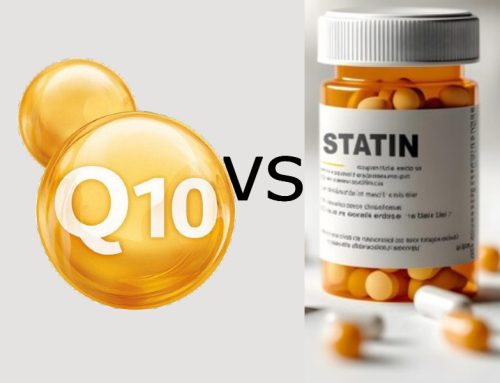Adjuvant therapy with Coenzyme Q10 added to conventional heart failure medication decreases all-cause mortality and hospitalization rate. It improves heart function and New York Heart Association functional classification. The add-on CoQ10 treatment also improves left ventricular ejection fraction and 6-minute walk test results in heart failure patients without any major adverse effects [Xu 2024].

Heart failure occurs when the heart muscle is too weak or too stiff to pump out as much blood as it should. Worsening heart failure leads to hospitalization and to increased risk of death. Adjuvant treatment with Coenzyme Q10 reduces the risk.
Xu et al reached the above conclusions based on an analysis of 33 studies enrolling 3,763 heart failure patients. Patients in the experimental group received Coenzyme Q10 as an adjuvant therapy together with conventional heart failure treatment. Patients in the control group received only conventional heart failure treatment with or without placebo.
Coenzyme Q10 and Heart Failure Terminology
Heart failure
Heart failure is a complex disease that affects millions of people world-wide. It results from abnormalities in the heart muscle. It diminishes heart function. Its symptoms are breathlessness and fatigue and fluid buildup in the lungs, belly, and lower extremities. There is a significantly increased mortality risk associated with a diagnosis of heart failure, especially among hospitalized patients [Xu 2024].
Heart failure involves mitochondrial dysfunction leading to disrupted ATP production, oxidative stress, and inflammation. Xu et al point out that CoQ10 supplementation is associated with beneficial effects on cardiac bio-energetics, oxidative stress, and chronic inflammation [DiLorenzo 2020; Dabbaghi Varnousfaderani 2023; Xu 2024].
Conventional medical treatment of heart failure involves the use of beta-blockers, ACE inhibitors, and angiotensin II receptor type 1 antagonists. However, these medical interventions have had limited success in reducing the mortality rates and the hospital readmission rates in heart failure patients [Xu 2024].
Adjuvant CoQ10 treatment boosts mitochondrial ATP production. This, in turn, increases heart muscle contractility [DiLorenzo 2020; Dabbaghi Varnousfaderani 2023]. Used as an adjunctive treatment, Coenzyme Q10 supplementation can reduce the risk of mortality [Al-Saadi 2021] and can improve left ventricular ejection fraction and New York Heart Association functional class [Sander 2006: Fotino 2013]. Furthermore, supplementation with Coenzyme Q10 has been shown to be well-tolerated and safe [Xu 2024].
Left ventricular ejection fraction
The term ejection fraction refers to the percentage of blood pumped out by the left ventricle with each contraction of the heart muscle. Normal ejection fraction lies between 55 and 70 percent. Heart failure patients may have reduced ejection fraction equal to or less then 40% or preserved ejection fraction equal to or greater than 50%.
New York Heart Association functional class
The severity of a patient’s heart failure can be seen the patient’s assigned NYHA functional class. The NYHA functional class is based on the extent of the patient’s fatigue, palpitation, or shortness of breath:
- Class I = No limitation of physical activity.
- Class II = Slight limitation of physical activity.
- Class III = Marked limitation of physical activity.
- Class IV = Symptoms of heart failure at rest.
B-type natriuretic peptide level
B-type natriuretic peptide levels in the blood give an indication of how well the heart is working. When the heart has to work harder to pump blood, it produces more of the BNP protein. Higher BNP levels are a sign of heart failure. CoQ10 supplementation is associated with reduced blood levels of this peptide [Mortensen 2014].
6-minute walk test
The 6-minute walk test measures the distance that a patient can walk in six minutes. The self-paced walking takes place on a standardized walk space following standard instructions. There are different norms for different age groups.
Best Coenzyme Q10 and Heart Failure Studies
Q-Symbio Study
In the international multi-center Q-Symbio Study, researchers assigned 420 chronic heart failure patients to take either 3 times 100 mg/day of the ubiquinone form of Coenzyme Q10 or matching placebos. The CoQ10 treatment was in addition to the patients’ normal heart failure medication [Mortensen 2014].
After two years, the study results revealed the following health benefits associated with the CoQ10 adjuvant treatment, compared to the placebo adjuvant treatment [Mortensen 2014]:
- substantially lower mortality rate
- substantial reduction in hospitalization related to worsening heart failure
- substantial improvement of heart failure symptoms, resulting in changes in the patients’ NYHA classification
Italian Multi-center Study
In the Italian multi-center congestive heart failure study, researchers assigned 641 patients to take a dosage of 2 mg/kg of body weight per day of the ubiquinone form of Coenzyme Q10 or placebo. Again, the CoQ10 treatment was in addition to the patients’ normal heart failure medication [Morisco 1994].
After one year of adjuvant treatment with Coenzyme Q10, the researchers observed the following health benefits [Morisco 1994]:
- substantial reduction of hospitalization for worsening heart failure
- substantial reduction of the incidence of serious complications
Conclusion: Adjuvant CoQ10 Treatment of Heart Failure
Xu’s meta-analysis has shown that adjuvant CoQ10 therapy for patients with heart failure reduces all-cause mortality, hospitalization for heart failure, NYHA classification, and BNP levels. Moreover, it improves ejection fraction and 6-minute walking distance.
The argument for adjuvant CoQ10 therapy of heart failure patients is as follows:
- Conventional heart failure treatment aims to inhibit physical factors that stress the heart.
- CoQ10 supplementation, on the other hand, aims to support energy metabolism in heart muscle cells and to give the heart muscle cells increased strength [Mortensen 2014].
- CoQ10 adjuvant treatment of heart failure patients is effective, well-tolerated, and affordable [Claxton 2022].
Sources
Al Saadi T, Assaf Y, Farwati M, Turkmani K, Al-Mouakeh A, Shebli B, Khoja M, Essali A, Madmani ME. Coenzyme Q10 for heart failure. Cochrane Database Syst Rev. 2021;2:Cd008684.
Claxton L, Simmonds M, Beresford L, Cubbon R, Dayer M, Gottlieb SS, Hartshorne-Evans N, Kilroy B, Llewellyn A, Rothery C, Sharif S, Tierney JF, Witte KK, Wright K, Stewart LA. Coenzyme Q10 to manage chronic heart failure with a reduced ejection fraction: a systematic review and economic evaluation. Health Technol Assess. 2022 Jan;26(4):1-128.
Dabbaghi Varnousfaderani S, Musazadeh V, Ghalichi F, Kavyani Z, Razmjouei S, Faghfouri AH, Ahrabi SS, Seyyed Shoura SM, Dehghan P. Alleviating effects of coenzyme Q10 supplements on biomarkers of inflammation and oxidative stress: results from an umbrella meta-analysis. Front Pharmacol. 2023;8(14):1191290.
Di Lorenzo A, Iannuzzo G, Parlato A, Cuomo G, Testa C, Coppola M, D’Ambrosio G, Oliviero DA, Sarullo S, Vitale G et al. Clinical evidence for Coenzyme Q10 supplementation in heart failure: from energetics to functional improvement. J Clin Med. 2020;9(5).
Fotino AD, Thompson-Paul AM, Bazzano LA. Effect of coenzyme Q10 supplementation on heart failure: a meta-analysis. Am J Clin Nutr.
2013;97(2):268–75.
Morisco C, Trimarco B, Condorelli M. Effect of coenzyme Q10 therapy in patients with congestive heart failure: a long-term multicenter randomized study. Clin Investigator. 1993;71(8 Suppl):S134–136.
Mortensen SA, Rosenfeldt F, Kumar A, Dolliner P, Filipiak KJ, Pella D, Alehagen U, Steurer G, Littarru GP. The effect of coenzyme Q10 on morbidity and mortality in chronic heart failure: results from Q-SYMBIO: a randomized double-blind trial. JACC Heart Fail. 2014;2(6):641–9.
Sander S, Coleman CI, Patel AA, Kluger J, White CM. The impact of coenzyme Q10 on systolic function in patients with chronic heart failure. J Card Fail. 2006;12(6):464–72.
Xu J, Xiang L, Yin X, Song H, Chen C, Yang B, Ye H, Gu Z. Efficacy and safety of coenzyme Q10 in heart failure: a meta-analysis of randomized controlled trials. BMC Cardiovasc Disord. 2024 Oct 26;24(1):592
The information presented in this review article is not intended as medical advice. It should not be used as such.








Leave A Comment